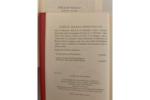What profit a tiger mom if she... ?
Amy Chua hit a nerve last month. In early January, her book, "Battle Hymn of the Tiger Mother," made its debut like Tom Brady dropping in on a sorority house. Book reviews and columnists leaped on the book. Local talk shows had the perfect topic to keep the blood flowing in cold weather. No one, least of all the talk show hosts, could keep from entering the fray and taking sides.
For those few who were too busy shoveling January's snow, Amy Chua is a Chinese-American mother of two, apparently accomplished, teenage daughters. She is also a Yale University law professor. Her Tiger-mother method of parenting boils down to all-work-and-no-play-makes-Jack-and-Jill Ivy League shoe-ins. Dull? Forgetaboutit!
The Tiger Mother Method [TMM] requires a parental full-court attack on the prevailing world of childhood. Professor Chua brags that her daughters were not allowed to watch TV, play videogames, have sleepovers, have playdates, get less than A grades in school or have any frothy deviations, like being in a school play or on a sports team. On the other hand, they must play either the piano or violin, and practice a minimum of three hours a day without complaint.
Chua's TMM is clearly an in-your-face rejection of the current American style of child rearing. First, American moms (and, yes, dads) have consciously or unconsciously thrown in with much of the self-esteem movement. We want our kids to be manifestly happy and we are there 24/7 with encouragement and rewards for effort and the slightest improvement. "Partial credit" at school and home earns rewards. Not so in the Chua TMM home. The only thing that "counts" is success at a very high level. Tiger Moms only care about accomplishments.
Second, American parents are guided by the caterpillar-to-butterfly metaphor. We warmly nurture the little creatures so that they will naturally discover their talents and skills and turn into these beautiful creatures who will one day fly away as free spirits. The Tiger Mom's approach is more like the blacksmith-anvil method of "pound away until you get the shape you want!" They are ready to sacrifice their children's (and their!) short term family comity and happiness for long term accomplishments. A major TMM goal is to have children who are not only highly successful, but deeply indebted to their parents and ready to stand by them in their old age. On the other hand, American parents settle for Social Security and emailed pictures from Cancun.
The indignation prompted by Professor Chua's book has been huge. While her Yale colleagues have not yet moved to rescind her faculty tenure, we are confident she has been blacklisted from the Law School dinner party circuit. But why the intense interest and outrage? Perhaps the TMM touches our national "worry button" about our children and our national survival. "Battle Hymn of the Tiger Mother" has appeared at a moment of heightened national uncertainty and self-doubt. Many believe that America's best days are behind us. Right after the book's initial flurry of attention, the stone-faced Chinese Premier arrived on our shores, reinforcing our concerns about both our economy and our position as world leader.
Then too, there is our growing realization that our educational system is on the wrong course. Actually, the alarm bells have been sounding for two or three decades, as one set after another of scores on international assessment test of math and science have revealed American students to be mediocre or worse. Recently, the Program for International Student Assessment (PISA) released the 2009 test results in which 15-year-old students from 65 nations competed in knowledge of math, science and reading. But how well did U.S. students do? Short answer: mired in the middle. Of the 65 nations whose students took the PISA tests, U.S. 15 year-olds were 23rd in science; 24th in math; and 17th in reading. This was the first year that Chinese authorities allowed their students to compete, and they burst out of the gate with stellar results, coming out on top in all categories: math, reading and science.
Then there are the uncomfortable facts about U.S. youth's world leadership in out-of-wedlock births and the rate of STD infection, in obesity, anorexia, drug and video-game addictions and cheating. It is little wonder, then, that the Chua thesis hits a nerve!
This book holds the promise of provoking a serious debate about how we are raising our children and how our schools are educating them. One hopes that between the manifestos of learning-must-be-fun educational gurus and those of the newly recruited army of Tiger Moms some balance will be struck. For instance, before sending our children to the corner for their three hours of daily violin practice, we need to reassess the importance of the skills and attitudes learned playing in the school band. Team work has been the hallmark of much of America's success in business and science, and futurists assure us that intellectual breakthroughs will depend on the ability to add creatively to group efforts.
But most strikingly absent from Professor Chua's successful parenting diktat and the controversy that is swirling around it is the question, "What is success?" What is she and, by extension, the rest of us, trying to "produce"? Great violinists? Concert pianists? Or champion networkers and team players, kids whose group skills take them up the corporate or scientific ladder?
Strikingly absent in so much of our angst-ridden discussion of parenting and education is the moral goal, our responsibility to raise children with a moral compass and good habits. (Dare we say "virtues"?) In other words, children with character. Don't we really want children with the goals and habits which will keep them at their homework and piano practice and who will sit down in the lunchroom at the table with that oddball kid who the other kids make fun of and share his sandwich with him?
In other words, isn't our primary responsibility to aid the young to become committed followers of Christ?
Kevin and Marilyn Ryan edited "Why I Am Still a Catholic" [Riverhead Books, 1998] and live in Chestnut Hill, Mass.



















